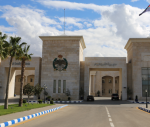You are here
OECD urges countries to step up support for fragile growth
By AFP - Nov 06,2014 - Last updated at Nov 06,2014
PARIS — The Organisation for Economic Cooperation and Development (OECD) called Thursday on the world's leading countries to step up measures to support flagging global growth, in particular urging the European Central Bank (ECB) to overcome its reluctance and undertake quantitative easing.
It made the appeal in an early update to its global economic forecasts before Group of 20 (G-20) leaders hold a summit next week in Australia.
Noting that risks to the global economy remain high and market volatility may rise, OECD chief Angel Gurria warned of an increasing risk of stagnation in the eurozone that would further darken already gloomy global economic skies.
"Countries must employ all monetary, fiscal and structural reform policies at their disposal to address these risks and support growth," he stressed.
The OECD, which provides economic analysis and advice to its industrialised country members, lowered its forecast for global growth this year by a tenth of a percentage point to 3.3 per cent.
For 2015, it cut the forecast by two tenths of a point to 3.7 per cent growth.
It left in place its forecast for the 18-nation eurozone to grow by 0.8 per cent this year and by 1.1 per cent in 2015.
Eurozone a 'major risk'
The OECD's chief economist Catherine Mann warned that "overall, the euro area is grinding to a standstill and poses a major risk to world growth..."
The organisation urged the ECB to expand its monetary stimulus programme given the very weak economy and the risk of deflation.
"This should include a commitment to sizeable asset purchases ['quantitative easing'] until inflation is back on track," it said, adding that the purchases could include government bonds, which the ECB has so far shunned due to political sensitivities in Europe about the central bank underwriting government spending.
The purchase of government bonds was the main element of the recently ended quantitative easing programme by the US Federal Reserve, and Japan last week stepped up its asset purchases in order to support growth.
The ECB left its interest rates at record lows at its monetary policy meeting Thursday, and while ECB chief Mario Draghi did not announce new asset purchases, he said the bank was preparing to undertake additional measures if necessary.
The ECB has so far focused its new monetary stimulus, designed to spur lending and investment by buying financial assets, on packages of loans known as asset-backed securities (ABS) and corporate bonds.
The ECB has said it could inject some 1 trillion euros ($1.25 trillion) into the economy in this manner, as a means to stem a slide in inflation to .04 per cent that is flirting with a dangerous deflation leading to economic contraction and job losses.
With a debate ranging in Europe over whether to let up on austerity measures, the OECD said "all room to engage fiscal policy must be exploited".
G-20 leaders are expected to adopt an economic action plan at the summit in Brisbane on November 15 and 16 with each nation making reform pledges.
"The potential pay-off from the structural reform agenda under consideration is tremendous," said Mann, saying the measures could add 2 per cent, or $1.6 trillion, to global economic output by 2018.
China slows, Russia trips
The OECD bumped up its forecast for US growth this year by a tenth of a point to 2.2 per cent, while leaving its 2015 forecast unchanged at 3.1 per cent.
Japan's growth forecasts were left unchanged at 0.9 per cent this year and 1.1 per cent in 2015.
Among emerging markets, which have been the source of most growth in the world economy in recent years, the OECD said China was set to slow as the government moved forward with efforts to achieve a more balanced and sustainable expansion.
It pared back its forecast for Chinese growth this year by a tenth of a point to 7.3 per cent, and by two tenths to 7.1 per cent in 2015.
The OECD dropped by three tenths of a point its forecast for the Indian economy this year to a 5.4 per cent expansion, but increased the 2015 outlook by five tenths to a 6.4 per cent growth.
It held Brazil's forecast for 2014 growth at 0.3 per cent, but raised the 2015 outlook by a tenth of a point to 1.5 per cent.
The OECD sees Russia managing 0.7 per cent growth this year, up from its previous forecast of 0.5 per cent, although this is still a major slowdown from the 1.7 per cent expansion the country recorded last year.
However, the OECD expects Western sanctions on Russia over its role in the Ukraine crisis to bite next year, dropping its forecast to zero growth from the previous 1.8 per cent.
"Russia is in go-slow mode, with the economy's course strewn with obstacles, including oil prices," said Mann.
Related Articles
PARIS — The world risks getting caught in a low-growth trap, denting the future of generations to come, unless governments step up spending
PARIS — The Organisation for Economic Cooperation and Development (OECD) sharply lowered its global growth forecasts for 2015 and 2016, drag
PARIS — The world economy is likely headed for a soft landing next year, the Organisation for Economic Co-operation and Development (OECD) s
















